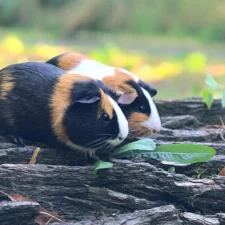March is Adopt a Rescued Guinea Pig Month! These little fellows are very popular children’s pets. In fact, they may have become more popular than most people know. They can be found in approximately 1.5 million homes. They also happen to be the third most sought-after pet in multiple American states, including Massachusetts, California, and New York. If you’ve been looking for a small, sweet, incredibly cute, and easy-to-care-for pet, a Guinea pig—or cavy, as they’re also known—might be the perfect choice. Continue reading as a local Bel Air, MD veterinarian answers some common questions about adopting a Guinea pig.
How Much Daily Care Do Guinea Pigs Need?
Guinea pigs are not the most high-maintenance pets, but they require regular attention. Every day, you’ll have to offer fresh food and water. In terms of diet, your tiny companion will want plenty of grass hay, commercial pellets, and approximately a cup of safe fruits and vegetables per day. Your veterinarian can offer you guidance on this.
You should also spot-clean your pets’ cage to remove garbage and uneaten food.
Cavies also require time out of their cages each day. You’ll need to petproof an area for them to play in.
When it comes to grooming, you will need to keep your pets’ nails clipped. Some cavies only need brushing, while others may benefit from baths. Ear cleanings are also on the agenda.
Ask your Bel Air, MD veterinarian for particular guidance.
What Types of Toys Do Guinea Pigs Need?
Guinea pigs have open-rooted teeth, which never stop growing. Your charming pets will require plenty of chew toys. You can construct a variety of toys from common things such as paper, cardboard, and even wood. You can also offer mazes and sturdy workout wheels.
Just stick with the safe options. Never give your pet anything small or sharp. Items with decorative coatings such as paint, varnish, glitter, or dye are also hazardous. Contact your veterinarian for further information.
Are Guinea Pigs Expensive?
Guinea pigs are quite inexpensive, but that doesn’t mean that they’re free. A good cage is essential. That is a one-time expense. However, you will have to provide food, bedding, toys, and veterinary care on an ongoing basis. Keep in mind that these guys can survive for ten years, although the average is closer to five or seven.
Are Guinea Pigs Good Pets for Kids?
Yes! They can make excellent friends for children. However, we do not advocate getting them for youngsters under the age of five or six, unless you plan to care for the animal yourself. Make sure to supervise all interactions.
What Are Common Guinea Pig Care Mistakes?
We could (and may) write a blog about this, but for now, we’ll simply go over the essentials.
Here are some of the most frequent errors:
Wire Housing: While cages with wire floors may be touted as being suitable for Guinea pigs, wire floors are an extremely poor choice. They do not hold bedding and may cause paw damage.
Lack of Vitamin C: Cavies require Vitamin C to remain healthy. If they don’t get enough, they risk becoming scurvy.
Getting Only One: Guinea pigs are pretty gregarious and require companionship.
Not Petproofing: These guys require daily playtime. However, it is critical to ensure that the location they are allowed to enter is safe.
Allowing Them to Interact With Other Pets: While Guinea pigs, cats, and dogs are all acceptable pets, they should never be allowed to play together.
Why is March Adopt a Rescued Guinea Pig Month?
Julie Morris, the ASPCA’s senior vice president for National Shelter Outreach, chose March in 2002. The purpose was—and continues to be—to promote awareness about the predicament of Guinea pigs in need of homes, and also encourage people looking for one of these adorable pets to adopt from shelters and rescues.
Why Should I Choose A Rescued Guinea Pig?
We believe that all animals deserve to be treated with love and kindness. We’re also always eager to promote giving abandoned pets a second opportunity for happiness. Rescuing a pet, big or tiny, can be a very enriching experience. It’s also an excellent way to promote good animal welfare.
Why Are There So Many Guinea Pigs That Need Homes?
These tiny fellas may be up for adoption for a variety of reasons. Sometimes, it’s just plain bad luck, like an owner’s death or illness, or even just financial hardship. In some cases, the owners were unable or unwilling to take their cavies with them when they moved. It’s also not uncommon for a child to repeatedly ask for a pet, only to lose interest in caring for it. Unfortunately, this often results in the pet being rehomed.
There’s also the fact that many people buy Guinea pigs on a whim, without considering how much care they need. We know, it’s difficult to resist those lovely faces. However, adoption is a big commitment! We cannot stress enough how important it is to do thorough research before adopting an animal.
What Are Some Fun Guinea Pig Facts?
The most surprising thing about Guinea pigs is probably the fact that they are not pigs and did not originate in Guinea. They are descendants of wild cavies from South America. Traders from Spain, the Netherlands, and England brought them to North America and Europe in the 16th century. They quickly became the favorite pets of the nobility. Queen Elizabeth even had one of her own!
How Do I Know If My Guinea Pig Is Sick?
It is critical to keep an eye out for signs of illness in your pet, regardless of its breed. If you detect anything, contact your Bel Air, MD veterinarian immediately.
Here are some things to look for:
- Withdrawal
- Limping
- Lack Of Appetite
- Diarrhea
- Dull, red, sunken or watery eyes
- Lethargy
- Sitting in stiff or hunched positions
- Refusing Water
- Crust on eyes
- Unkempt Fur
- Drooling
- Stumbling
- Bloody urine
- Hair loss
- Skin irritation
- Lumps, bumps, or lesions
- Erratic/Unusual behavior
- Weight loss
It’s extremely important to find a vet who is familiar with Guinea pigs. Many drugs, including amoxicillin, can be fatal to them.
What Irritates Guinea Pigs?
All of our animal buddies have their own pet peeves. Even tiny animals, such as cavies, may be bothered by certain things. At the top of the list? Being rubbed the wrong way. You may discover that your pet dislikes being touched or petted in specific areas. Basically, anything beyond the head, back, and shoulders is generally off-limits.
What other things do these small fellows dislike? Being picked up or held against their will is a big one. Your pet may get stiff or start making sad noises.
Guinea pigs are also averse to loud noises, automobile rides, and strong scents. They also don’t like nail trims or baths, though these may be considered necessary evils. Ask your veterinarian for grooming tips.
Should I Pet My Guinea Pig Every Day?
Taking the time to pet, hold, and play with your tiny ones will help the two of you bond. This can also make them feel loved and secure. Just don’t force it! That will cause more harm than good, and may even make your cavies afraid of you. It’s also a good idea to let your tiny pals settle in before handling them.
Conclusion: Guinea pigs are very cute and popular, but they do require a daily care. Always do your research before adopting a new pet.
Do you have any queries about Guinea pig care? Contact us, your Bel Air, MD pet hospital today!







